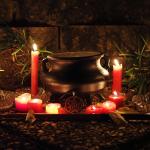
Tim Dalrymple is a good guy. If I were in the midst of paintball battle or organizing an interfaith event, I could do much worse than having Tim on my team. However, Tim is an evangelical Christian, and acts like one. His opinions and arguments are formed by Evangelical Christianity, and it also informs his actions. Which means in certain contexts, Tim is predictable. As am I. In a debate on same-sex marriage you could probably represent Tim and I with puppets repeating the “party line” of our respective faiths and not go too far off the mark from our own personal views.
So Tim and I can kick back with a glass of sauvignon blanc and discuss our religious views and experiences into the wee hours of morning, and when dawn breaks Tim will still deeply wish I followed Christ and I will still wish he’d evolve on social issues. Despite these wishes, Tim has never tried to convert me, and I have never insisted he change his mind on gay marriage. We know our boundaries, both have good manners, and get along fine because of them.
That doesn’t mean we don’t occasionally read each other’s blog and roll our eyes. It doesn’t mean we don’t press each other when we think the other’s argument is weak or fallacious. It doesn’t mean we have any intention of ever accepting the other’s views. We respect and tolerate each other but I’ll be belting out the song “Awesome God” as soon as Tim starts dancing around a bonfire in a sarong. Let’s not hold our breath.
Recently Tim saw something he found interesting on my blog, and decided to comment on it. And people got pissed. Because Tim, an Evangelical Christian, acted like an Evangelical Christian. But if you strip out his obligatory “Great Commission” affirmation, he didn’t say anything I really disagreed with. Of course, not being Pagan himself, he got more heat for it than I get for saying the same thing.
So I want to take a look at his post in detail:
Personally, of course, I don’t want Pagans to find religion, because I want pagans to recognize that the great God above all gods become incarnate and communicated his love and reconciliation to the world through Jesus Christ, the God-man.
Tim believes in the Great Commission. This statement is no surprise. Much preferable than calling us baby-killing devil-worshipers out to turn your kids into hippies. I want Tim to say gay marriage is great. Again, neither of us are holding our breath on this.
On the plane with Star beside me, I had to ask her a question: When you honor Hephaistos, do you believe that Hephaistos (and the whole pantheon, for that matter) truly exists or do you honor Hephaistos as a symbol for important truths and values? I believe Hephaistos truly exists, she said, just as you believe in your God.
This went down awhile back. Maybe 2 years ago. It was a three hour flight with a long, rambling theological discussion. People sitting near Tim and myself were mostly trying to nap. I never got a dirty look, but I doubt the rest of the flight appreciated our discussion.
Star, who was raised in a conservative evangelical environment, fully understood the language and said that she experiences Hephaistos personally and devotionally when she prays to him and strives to lead the kind of life that would honor him. And many of the authors at Patheos’ Pagan Channel, some in more sophisticated ways than others, will say the same thing and will explore that experience theologically.
This is probably the single nicest thing any Christian has said about Patheos Pagan. I do think we have articulate writers who can not only communicate their spiritual experiences and thoughts to other Pagans, but to people of other faiths as well.
As a Christian, of course, I grieve the growth of modern Neo-Paganism. I know that my Pagan friends would not appreciate this characterization (since they would not want Paganism perceived as merely a negative rejection of Christianity instead of a positive affirmation of something discovered and true and valuable), but the growth of Paganism in the modern west, especially in America, speaks volumes about the failures and the excesses of the Christian church — and especially of Christian fundamentalist communities, from whose ranks many Pagans defect.
I agree that our growth is partly due to the failure of the Christian church. Tim and I disagree about how it is failing, but many of us did consciously walk away from the church because of its inability or unwillingness to meet our spiritual and moral needs. I grieve the growth of conservative Christian influence in the US. Again, no surprises here.
Personally, I agree with virtually none of it. I find the historical scholarship of the Pagan communities sorely wanting, and the philosophy and theology behind it all is not yet mature. Although it’s always harder to hear an outsider say it, I think most thoughtful pagans agree (and many say openly) that there is, quite naturally, a lot of growing left to do. This particular revival of pagan religions and mystery cults is a relatively recent phenomenon, and it bears the marks of newness, as many of its new adherents try to figure out what it really means, for example, to honor Baba Yaga or Isis, or to honor (as many Pagans do) a whole potpourri of deities from many traditions.
First of all, Tim hasn’t deeply studied Paganism, so on a cursory glance our history does seem lacking. Pagans discuss the problems with the history presented in our communities frequently. And of course, there is some pot calling the kettle black, as many Pagan scholars work to undue the revisionist history wrought by Christian scholars. Particularly with the first 4 centuries CE there is a lot of contention. If you look at the number of Christian scholars studying Christian history and the number of Pagan scholars studying Pagan history, the numbers are off, even adjusting for the difference in community size. Many Pagans rely on the work of non-Pagan scholars, and we have a lot of amateur scholars out there, myself included, that can sometimes muddy the waters.
Is our philosophy and theology mature? I think ancient pagan philosophy and theology is mature, but while we still retain a good bit of that we lack some of the context it was created in. Have we as a community made a concerted effort to bridge the centuries and connect that to our modern movement? Have we created a mature theology and philosophy for the newer Pagan traditions? I don’t think we have. I think some good progress is being made, but there is so much pushback and contention in merely the idea of Pagan theology that I think it’s going to take some time. And we may have little say in how our beliefs and practices are codified in the future. Maturity means that when asked the questions that plagued ancient pagan philosophers we can answer with some confidence rather than writing off the question as irrelevant or silly or giving a vague, fundamentally illogical answer. A lot of us simply aren’t there.
That said, like Christianity, most ordinary Pagans will be fundamentally uninterested and unable to give a theological argument for their faith. I bet I could walk up to any Methodist on the street and be unable to get mature answers from them on their faith. Theology will always be for religious nerds, debating Cicero and Marcus Aurelius against Augustine and Chrysostom as vehemently as convention-goers debating Kirk VS Picard.
Speaking as a scholar of religion, however, I find it utterly fascinating. It’s like watching new religions take shape right in front of you, and observing the processes that transform ideas into teachings, teachings into communities, and communities into institutions and traditions. Sects are becoming religions.
I agree. And we are becoming religions, with just as many schisms over morality and theology as the most fractured branch of Protestantism. It is endlessly fascinating. I do think that the modern Pagan movement’s growth in some ways may mirror the wildly diverse and eclectic early Christian communities growth, particularly in our contentiousness.
But there’s that toxic word — religions. And here’s where something that Star wrote recently can teach us about the “spiritual but not religious” movement. She describes how, as a devotee of Hephaistos, she was asked to edit an anthology of devotional writings for Hephaistos. In the end, she could not do it — and the reason was because she found that her own personal experience of Hephaistos had very little in common with the personal experiences of others
Tim, you are preaching to the choir. I have written before about the SBNR movement’s effect on Paganism, and I believe it creates a less cohesive community as we have as many faith systems as we have Pagans. How many of us have friends or family who can articulate what we believe after we die? Or will they just shrug and say we owned some tarot cards and books by Buckland? If modern Paganism is lost to history, it’s our own damn fault. We aren’t building communities based on common values, beliefs and practice because we have this strange idea that to do so is bad, although we do believe that our values, beliefs and practices are good. If you have a cheesecake, do you not offer a slice to your friends, believing it to be good? Do you not bond over the goodness that is cheesecake, washed down with strong coffee on a Sunday afternoon?
Spirituality (“deep personal religion”) as it matures, grows into public “religion,” into community and doctrine and institution. Otherwise, it cannot cohere, cannot solidify, cannot survive.
I cannot disagree. Ancient pagans had these things, and Hindus still have them. There are Pagans today who want these things but get shouted down for this natural desire to see their deeply held values and beliefs thrive and prosper beyond their own short lives. Ancient paganism fell apart because it didn’t express solidarity until it was too late (why should a priest of Ops care if the temple of Isis was attacked by a Christian mob?), and we can learn from that or repeat the mistakes.
This will sound harsh, but those who identify themselves as “spiritual but not religious” are outing themselves as immature in their beliefs and passions. Star is not immature. She yearns for the “larger framework” and the “common ground.” She yearns, within Paganism, to be spiritual and religious.
I am immature. I watch Troma films and giggle like a little kid.
I think Tim’s language here is indeed harsh, but I think the underlying sentiment rings true.
As Kierkegaard would say, without interiority, faith is a fraud. One must be “spiritual”; in evangelical terms, one must have a personal relationship, an enduring inter-personal encounter with God in Christ. But the exterior too is positively necessary, not only in public deeds but in the public mechanisms that define and guide a religious tradition and pass it down the stream of generations. That is, one must also be “religious,” a part of the Body, guided by the wisdom of the tradition, which cannot survive without institutions.
To translate: one must have a spiritual practice and a community practice. You can’t just be a “festival Pagan” and you can’t just be an isolated solitary for our movement to mature. We need both. And we already have institutions: CoG, ADF, OBOD, ATC, The Troth, Circle Sanctuary, Pagan Pride, Lady Liberty League, Reclaiming and others.
The next time you hear someone say they’re “spiritual but not religious,” remember Star, who has recognized that being religious is nothing to be ashamed of.
While hardly a new revelation on my part, I’ve always said I was a religious Pagan. I didn’t come to Paganism because I rejected religion. I came to Paganism because I rejected the doctrine of other religions. I came because I found my gods here. I found my values and faith here. And over 13 years later I’m still struggling to understand, still wrestling with theology, with values, with faith, with the gods and with practice. Because I’m in a wilderness. We all are. We’ve arrived on a mostly abandoned continent armed with a hatchet, shovel and machete, trying to uncover the ruins of the past, which have long since been covered over with the kudzu of another religion. While we do this work of uncovering and restoring, we are also busy trying to survive, to meet our daily needs.
I’m lucky enough to have arrived at a time when we already have a solid base camp formed, but for us to go around saying we have a shining city is ridiculous. Particularly when so many are trying to keep us confined to base camp, to a rough ghetto, extolling the virtues of being “spiritual not religious” as if we were theologically Amish and cut ourselves off at 8th grade religion forever.
Screw that. Tim is right. I’m not ashamed. Being religious and desiring religion is nothing to be ashamed of.
I don’t have a problem with Tim’s post. I was rather pleased and flattered that he pegged us so well. I think it speaks very well of this experiment called Patheos when Evangelical Christians can write intelligently about Paganism.
As for the parts of Tim’s post I disagreed with? That’s a Christian behaving like a Christian. Not surprising or newsworthy or even offensive. It was pretty honestly put. Dead wrong to my point of view, but then you can’t expect me to act like anything but a Pagan.















